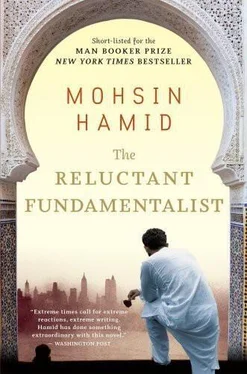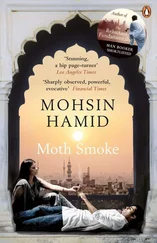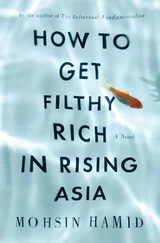You must remember that I was only twenty-two and this had been my first proper job; at such an age and in such a situation events have an emotional resonance that is perhaps exaggerated. In any case, I felt as though a world had ended — which, indeed, it had — and I made my way to the East Village on foot. I imagine I was a rather odd sight — a distraught and hirsute Pakistani carrying an unmarked box through the center of Manhattan — but I do not recall receiving any untoward comments from passersby; then again, I was in all likelihood too preoccupied to have noticed.
In my flat I poured myself a whiskey and sat thinking. It was still early — not yet midday — and so I decided to call my family. My brother answered. He had received the money I had sent, he said, and workers had already dug up and exposed our rotting pipes. By tomorrow they ought to have been replaced. I told him that I had decided to move back to Lahore. He attempted to dissuade me; tension with India was mounting. He had been recently to Islamabad, he said, and spouses and children of foreigners assigned to embassies and NGOs were leaving the country. I explained that I had no choice; “I got fired,” I said, “and my visa will soon be invalid.” He told me the family would of course look after me. I did not say that I had hoped to be the one looking after them, and I continued to cradle my drink for some time after the call was done.
But your own glass, sir, has now remained empty a good while. Shall I request our bill? A quick wave and yes, here he comes. How much, you ask? Please do not worry yourself; you are a guest here and this — it is only a tiny amount — is on me. You wish to pay half? Absolutely not; besides, here we pay all or we pay none. You have reminded me of how alien I found the concept of acquaintances splitting a bill when I first arrived in your country. I had been raised to favor mutual generosity over mathematical precision in such matters; given time both work equally well to even a score.
I had not, however, been schooled in the etiquette of how best to contact a lover who had retreated to a mental institution, and so I vacillated between emailing Erica and going to see her in person. In the end, my decision was made for me: I tried to email her but my message bounced back — with a notice saying it could not be delivered because her inbox was full — and so I rented a car and appeared at the facility unannounced. I was told at reception that visitors without invitations were not welcome — and in any case they could neither confirm nor deny if Erica was even there — but just as it seemed they were about to ask me to leave, I saw the nurse I had met on my previous trip and appealed to her to intervene on my behalf.
“I’ll talk to him,” she said to the receptionist, taking me aside. She looked flustered and suggested I sit down. “What do you know?” she asked me. “What do I know,” I said, “about what?” “I’m so sorry,” she said. “Erica’s gone.” I asked what precisely she meant, gone, and the nurse explained. Erica had vanished about two weeks ago, indeed shortly after I had seen her last. She had not liked to be alone when she had first come to the institution; she would spend hours with the nurses and the counselors and her fellow patients, and especially with the nurse with whom I was speaking. But towards the end of her stay she had increasingly been wandering off by herself, until one day she had walked out and not come back. Her clothes had been found on a rocky bluff overlooking the Hudson, neatly folded in a pile.
“Are you trying to tell me that she killed herself?” I said. “They haven’t recovered any remains,” the nurse said, “and she didn’t leave a note. Technically she’s a missing person. But she’d been saying goodbye to everyone.” I asked if she could show me the place from which Erica might have jumped, and she led me through the grounds until we stood there. It was a beautiful spot to commit suicide, perhaps to run out from between the snow-dusted conifers, to push off from the granite and sail through the air, gazing across at the far bank of the mighty river, where a small house exhaled smoke from its chimney, before crashing into the icy current below. But I could not imagine Erica’s pale, naked body following that arc.
So I drove back to the city and went immediately to her apartment. Erica’s mother was not wearing any makeup; I noticed her eyebrows were so fine as to be almost nonexistent. I explained that I had just returned from the institution; had she heard from Erica? Her mother stared at me as though I had slapped her without provocation. “No,” she said, recovering herself and speaking wearily, “I’m afraid not.” “Please know,” I said, “that I will do anything which is of assistance to you.” “Thank you,” she said, inviting me inside. She told me that the emergency services would remain on the lookout for Erica, and ongoing advertisements had been purchased in the local newspapers; beyond that there was little one could do. We attempted to speak of inconsequential matters, but this proved difficult — when she asked how I was, I said I had just been fired; when I asked the same, she could only muster a wan smile — and so we sat mainly in silence. But before I left, she did two things, I suspect out of kindness: first, she told me that Erica had mentioned that she had found me rather dashing in my new beard; and second, she gave me a copy of Erica’s manuscript. “Maybe,” her mother said, “you’d like to read it.”
I did not do so for over a week; it sat undisturbed on top of my television. During that time I waited for a sign from Erica — an email, a phone call, a ring on my buzzer — but none ever came. I wandered about the city revisiting places she had taken me to, whether because I thought I might see her or because I thought I might see something of us, I am not now certain. A few of these places — such as the gallery in Chelsea we had visited on the night of our first date — I proved unable to find; they had vanished as though they had never existed. Others, like the spot in Central Park where we had gone on our picnic, were easy to locate but seemed to have altered. Perhaps this was the effect of a change in season; perhaps also it was in the city’s nature to be inconstant.
I remembered Erica in September, at what was still the start of our relationship, just after the attacks on the World Trade Center. Although it is traditionally associated with the end of summer and the impending arrival of autumn, September has always seemed to me a month of beginnings, a spring of sorts — possibly because it marks the commencement of the academic year. I was diving into my life in New York in September, full of optimism at what was to come. One evening I was walking with Erica through Union Square and we saw a firefly. “Look!” she said, amazed. “It’s trying to compete with the buildings.” Indeed it was: a tiny greenish glow visible up close but overwhelmed by the city’s luminance when viewed from even a modest distance. We watched as it crossed Fourteenth Street, headed south. Erica stood in front of me, her back to my chest, and I placed my arms around her, resting my palms on her belly. It felt an intimate gesture — like that of an expectant father with his pregnant wife — and she leaned against me. I can still recall the movement of her muscles as she breathed. A taxi sped by and we lost sight of the firefly. “Do you think he made it?” she asked me. “I have no idea,” I said, “but I hope so.”
Such memories occupied my waking hours in those days after her disappearance, and likely also permeated my dreams; they were in that period my only form of contact with her. But eventually I did read the manuscript her mother had given me. I must admit, I was frightened to do so — as though it might be the last time I would hear Erica’s voice — and I was nervous about what that voice might say. Yet her novel was no tortured, obviously autobiographical affair. It was simply a tale of adventure, of a girl on an island who learns to make do. The narrative shimmered with hope, and although it was for the most part rather spare, it paused often to delight in little details: in the texture of the skin of a piece of fallen fruit, for example, or in the swaying antennas of crayfish in a stream.
Читать дальше












